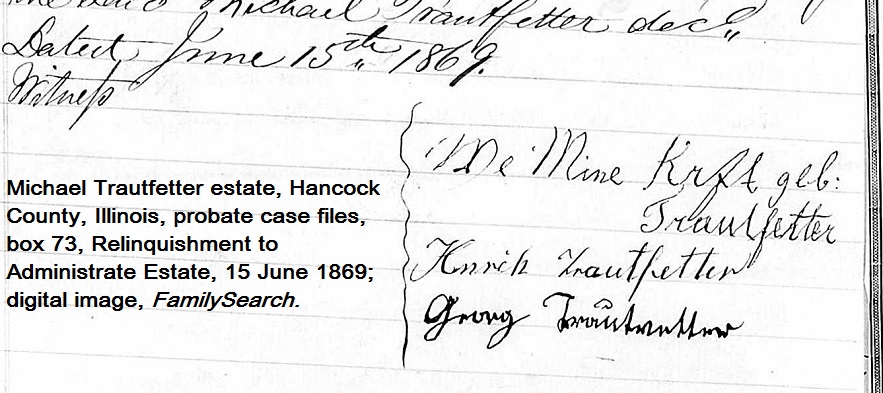In some families the spelling of the name generates much gnashing of teeth.
It is that way in the Trautvetter family.
Generally speaking, my personal “how do I spell their name” when referring to them in writing decision is based upon:
- how the person signed the name
- how the person’s name appeared on their tombstone
- which name was used a majority of the time
The approach is not perfect and it’s just as much art as it is science in some cases. The problem exacerbated in those families who have names with origins in languages other than that they speak and the country in which they live. And then there’s always problems such as:
- Some individuals never sign any documents.
- Some individuals do not have extant tombstones.
- Some clerks use creative spelling.
This 1869 document is the only one I have that is signed by Hinrich Trautfetter and was signed as a part of the settlement of his brother Michael’s estate. Hinrich appears in other records, but this is the only signature of his I’ve been able to locate to date. Hinrich died while this estate was being settled.
His sister Mine Kraft spells her maiden name as Trautfetter and his brother George spells his name as Trautvetter.
And that’s pretty much what their descendants did. Most of Hinrich’s descendants used either Trautfetter or Troutfetter and continue to do so to this day although there are a handful who use Trautvetter. George’s descendants almost entirely use Trautvetter.
This is the first actual signature I have providing evidence of a difference in spelling. George’s signature appears in other documents and he is consistent in how he spells it.
Hinrich’s son Christian’s signature appears twice in this probate file. Once he writes Troutfetter and once he writes Troutvetter. Apparently by the time Christian went to Kansas in the 1880s, he had made up his mind to use Troutfetter. Individuals were not always consistent in how they spelled their name.
My prime directive: transcribe it how it is spelled in the actual document and pick one “standard” spelling to use when referring to the individual in other writing. And somewhere make reference to why that standardized “spelling to use in writing” was chosen.


5 Responses
Cemetery names are not reliable as I found out when I was looking at a family lot with maybe 15-20 headstones and the name was spelled 3 different ways.:}
“What did the clerk hear?” In German, the “v” at the beginning of a word or syllable gets pronounced like the letter “f” in English (and “au” sounds like the English “ow”). So if the native German speaker is faithful to the original pronunciation, the name could easily sound to the American ear like “trout-fetter”.
That’s true and easily explains when clerks write it differently. The additional fly in the ointment in this case is that I have signatures written both ways 😉
I have some German immigrants who adjusted the spelling of their name to Americanize it — using standard American spelling rules. W become v, v become f, ei and ie get all mixed up. The Swedes did the same thing, such as dropping the second s in names like Nilsson.
I spell it Troutfetter. It’s my maiden name